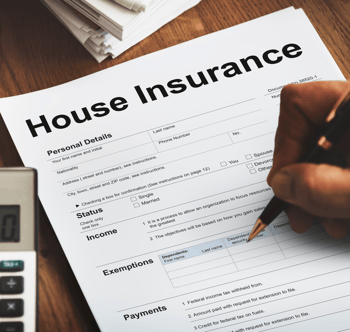
Sooner or later during the process of buying a new home, you'll have to give some consideration to homeowner's insurance if you intend to finance, and the sooner you understand what it is the better.
Let's look at the basics of homeowner's insurance – specifically what it is and what types of damages it covers – to give you a heads-up on this important aspect of buying a new property.
What Homeowner's Insurance Is
To start off with, homeowner’s insurance is not the same thing as mortgage insurance, which you may have also heard of. Mortgage insurance is mandatory by default if property buyers deposit less than a 20% down payment on a home. It protects the creditor who grants a loan to a home buyer who normally would not be able to finance such a large sum of money.
Homeowner’s insurance, however, covers the property owner rather than the lender. It's a kind of property coverage that protects against damages to a person's home and losses of personal assets inside the home. It also offers liability protection against accidental injuries inside the house or in the yard.
 How Homeowner's Insurance Works
How Homeowner's Insurance Works
If you plan to request a mortgage on a home, many financial institutions and lenders will request proof of homeowner's insurance on your property before lending you money. You may be asked to purchase directly from the lender or from another institution.
Having homeowner's insurance can give you an advantage toward getting approved for your mortgage. Especially due to the latest mortgage laws in place, you want lenders to view you as the least risky borrower as possible.
If you'd rather acquire your own insurance, you can compare different plans and choose the one that best suits your specific requirements. If you don't have your property insured against losses or damages, your lender can obtain insurance for you at an additional expense.
Payments you make on your homeowner’s insurance coverage are typically included in your monthly mortgage payments. The lender you make your payment to sets aside a certain amount for your insurance policy into a trust account. When your insurance payment is due, the money is taken out of this trust account.
What Homeowner's Insurance Covers
Homeowner’s insurance coverage generally addresses four kinds of situations that might occur on an insured lot: damage inside the home, damage to the exterior, loss or destruction of personal possessions, and accidental injuries that happen on the property.
Any time a claim is filed for these types of occurrences, you will need to pay an insurance deductible, which is basically your self-assumed cost as an insured homeowner.
To illustrate, let's say you file a claim for toxic mould damage you discover inside your home after you've insured it. The total expense of restoring your property back to a habitable state is determined by an insurance adjuster to be around $12,000. If your claim is accepted, you will be notified of the cost of the deductible based on the specific insurance contract you agreed to.
Assuming your deductible comes out to be $5,000, your insurance provider will cover the extra cost, which in this case would be $7,000. The larger the deductible is on your plan, the cheaper the yearly or monthly cost of your homeowner’s insurance coverage.
Liabilities and Exclusions
All homeowner’s insurance plans have liability limitations. These limits establish the degree of protection you have in the event of an unexpected accident. These limitations are typically fixed at around $100,000, but you can seek to increase this limit.
If an insurance claim is indeed filed, this limit dictates exactly how much coverage would be applied to replacing lost items or fixing property damage, as well as costs incurred to live elsewhere while your home is repaired.
Certain political acts (war) and acts of God (floods, earthquakes, etc.) are usually not covered in common homeowner’s insurance plans. On the other hand, most standard homeowner’s insurance plans provide coverage for weather crises such as tornadoes and hurricanes.
What Homeowner's Insurance Does Not Cover
Homeowner’s insurance is sometimes also confused with home warranties, which are legal agreements that take care of repairing or replacing household units and appliances like stoves, water heaters, washing machines, dryers, and pools.
These short-term agreements generally lapse once a certain amount of time has passed (usually a year), and you aren't required to have them to get a mortgage. Whereas homeowner’s insurance won't pay for damages caused by improper maintenance or unavoidable wear and tear, home warranties will.
You should now have a clearer picture of what homeowner's insurance is and what it is not. While it isn't legally mandatory to have if you're not financing, it's highly recommended for all owners of both new and old properties. Without homeowner's insurance, unpleasant circumstances can put your property, your loved ones, and your bank account at risk.
Regardless of how well-constructed your property is, it's still susceptible to fire, flooding, and accidents that may result in expensive lawsuits. With homeowner's insurance, though, you've got it covered – just in case.





